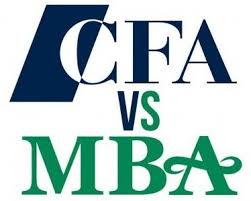CFA vs MBA: Which Path is Right for Your Finance Career?
CFA vs MBA: Which Path is Right for Your Finance Career?

Accounting
In the competitive world of finance and business leadership, professionals often reach a critical crossroads in their career advancement: Should they pursue a Chartered Financial Analyst (CFA) designation or a Master of Business Administration (MBA) degree? While both options open doors to high-level roles and significantly enhance one’s credentials, each has distinct advantages, career paths, and skill development opportunities.
This article provides an in-depth comparison of the CFA and MBA—exploring their core differences, benefits, costs, career outcomes, and which one may be a better fit depending on your professional goals.
What is a CFA?
The Chartered Financial Analyst (CFA) designation is a globally recognized certification granted by the CFA Institute. It is considered one of the most prestigious credentials in the fields of investment analysis, portfolio management, and financial research.
To become a CFA charterholder, candidates must pass three rigorous exams (Levels I, II, and III), demonstrate at least 4,000 hours of relevant professional work experience, and commit to a strict code of ethics. The CFA curriculum focuses heavily on financial reporting, quantitative methods, economics, ethics, portfolio management, and equity and fixed income analysis.
The CFA is particularly valued in roles such as:
-
Investment analyst
-
Portfolio manager
-
Equity research analyst
-
Financial risk manager
-
Chief investment officer (CIO)
What is an MBA?
A Master of Business Administration (MBA) is a graduate-level degree that offers broad training in business and management. MBA programs typically span 1 to 2 years and cover topics such as marketing, operations, strategy, entrepreneurship, finance, and leadership.
Unlike the CFA, the MBA is a more holistic qualification. It not only equips students with technical knowledge but also emphasizes interpersonal and strategic leadership skills. Many MBA programs offer concentrations, including finance, consulting, or data analytics, which allow students to tailor their education to a specific field.
An MBA can open doors to diverse roles such as:
-
Financial manager
-
Management consultant
-
Corporate strategist
-
Business development executive
-
Chief financial officer (CFO)
CFA vs MBA: Key Differences
While both the CFA and MBA are highly respected, they differ significantly in structure, content, time investment, and outcomes. Let’s examine the most important distinctions.
Curriculum Focus
CFA:
-
Specializes in finance, investment management, ethics, and quantitative analysis.
-
Deeply technical and ideal for those pursuing careers in asset management, hedge funds, or research.
-
Emphasizes self-study and mastery of financial modeling, valuation, and portfolio strategy.
MBA:
-
Broad coverage across all business disciplines, including marketing, HR, operations, and strategy.
-
Suitable for professionals seeking leadership roles across multiple departments or industries.
-
Includes case studies, group projects, presentations, and internships to build real-world leadership experience.
Time & Flexibility
CFA:
-
Takes an average of 3-4 years to complete all three levels.
-
Requires disciplined self-study and typically no formal classroom environment.
-
Ideal for professionals who want to study while continuing full-time work.
MBA:
-
Full-time MBA programs typically take 1-2 years; part-time and executive MBAs can extend longer.
-
Demands more immersive and structured in-person or online learning.
-
Often requires students to step away from their job, especially in full-time formats.
Cost & Investment
CFA:
-
More cost-effective, with total costs averaging between $2,500 to $8,000, including registration and exam fees.
-
No living expenses or tuition typical of university degrees.
-
ROI depends heavily on passing all levels and applying the credential in finance-focused roles.
MBA:
-
Can cost anywhere from $20,000 to $200,000 depending on the school and location.
-
Includes tuition, books, and often significant opportunity costs if pursuing full-time.
-
Higher salaries are typical post-MBA, especially from top-tier institutions.
Career Pathways
CFA:
-
Ideal for roles requiring advanced knowledge in investment and financial analysis.
-
Common job titles include financial analyst, asset manager, or fund manager.
-
May not be as useful for general management, marketing, or operations roles.
MBA:
-
Opens broader career options across industries, including consulting, tech, healthcare, and entrepreneurship.
-
Prepares professionals for leadership and management positions in finance and beyond.
-
Especially powerful when earned from a top-ranked business school.
Recognition and Global Reach
CFA:
-
Recognized globally in finance and investment circles, especially in capital markets, banking, and asset management.
-
Considered the gold standard for analysts and fund managers.
MBA:
-
Recognition varies significantly depending on school ranking and region.
-
Top global programs (e.g., Harvard, INSEAD, Wharton) carry strong international reputation and alumni networks.
Skills Developed
CFA:
-
Quantitative analysis
-
Financial modeling
-
Ethical decision-making
-
Investment strategy
-
Risk management
MBA:
-
Strategic thinking
-
Team leadership
-
Business communication
-
Negotiation and decision-making
-
Innovation and entrepreneurship
Which is Right for You: CFA or MBA?
The choice between CFA and MBA depends largely on your career goals, industry, and professional preferences.
Choose the CFA if:
-
You want to become a portfolio manager, equity analyst, or work in asset management.
-
You are passionate about finance and want deep, specialized technical knowledge.
-
You prefer self-study and working full-time while earning your credentials.
-
You are cost-conscious and seeking a high ROI for roles in capital markets or investment banking.
Choose the MBA if:
-
You aspire to leadership or executive positions across different business functions.
-
You want to pivot your career into a new industry or business discipline.
-
You are interested in networking, soft skill development, and access to a broad alumni base.
-
You value experiential learning through internships, consulting projects, and global exposure.
CFA + MBA: Can You Do Both?
Many professionals pursue both credentials to build a powerful combination of technical and strategic expertise. This is especially common for those aiming for CFO or senior finance leadership roles. While challenging in terms of time and financial commitment, combining a CFA and MBA can provide a unique edge in high-level roles requiring deep analytical and managerial capabilities.
Read more about: How to Become a Chief Financial Officer (CFO)
Salary Comparison: CFA vs MBA
While salaries vary by role, industry, and geography, here are general trends:
Average CFA Charterholder Salary:
-
Entry-Level: $70,000 – $100,000
-
Mid-Level: $100,000 – $160,000
-
Senior-Level: $200,000+
Average MBA Graduate Salary:
-
Entry-Level: $90,000 – $130,000
-
Mid-Level: $120,000 – $200,000
-
Senior-Level: $250,000+
Salaries for MBAs often depend on the school attended and post-MBA industry (e.g., consulting or tech may offer higher packages). CFA salaries are more tightly linked to experience and financial market expertise.
Both the CFA and MBA offer compelling benefits for professionals in finance and business. Choosing between the two—or deciding to pursue both—requires a clear understanding of your career vision, learning style, and the types of roles you aspire to. While the CFA equips you with deep finance expertise and credibility, the MBA provides broader leadership and business acumen.
Ultimately, your success will depend not only on your credentials but also on your ability to apply your knowledge, lead teams, and adapt to a dynamic and competitive business environment.
If you’re still undecided, consider your long-term career aspirations, the learning experience you seek, and the investment you’re willing to make. Either path can accelerate your growth—when aligned with your goals.
Related Articles
Explore Articles on Finance, Accounting, and Career Growth


